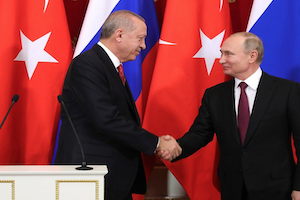Turkey's Russia Affair
By Suat Kınıklıoğlu
September 23, 2019
Turkey’s deepening partnership with Russia needs to be situated within a larger context. Turkey is moving closer toward Russia at a time when the West is beset by considerable turmoil. Seen from Ankara, both Europe and the U.S. increasingly look weaker, divided and ideologically adrift. Above all, though, Ankara’s pivot toward Moscow is driven by the domestic political needs of the Turkish leadership. The primary benefit of deepening the relationship with Russia lies in the legitimization of the current authoritarian rule. Yet ultimately the endeavor to reorient Turkey toward Russia and Eurasia faces the challenge that Turkey’s democratic tradition poses.

A "Eurasian Turn" in Turkish Foreign Policy? Not Likely
By Toni Alaranta
January 31, 2018
No substantial “Eurasian turn” of Turkish foreign policy is likely – or at any rate likely to be lasting. However, the deterioration of the Turkish-Western relations has nonetheless helped bring about an unholy alliance of various “anti-Westernists,” secularist-nationalists and Islamists, which is anything but insignificant in terms of domestic politics. The regime has been bolstered, as it can now count on being supported by at least some secularist nationalists in the name of “anti-imperialism.”



